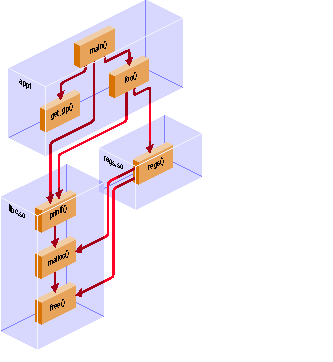
App1 contains the following files:

Figure 4-1 : Call Tree for App1 The source code for the original versions of main.c, foo.c, gp.s. and regs.s are shown below.
/* main.c */
extern void foo();
main()
{
unsigned gp,ra,sp, get_regs();
double d1 = 1.0;
double d2 = 2.0;
double res;
gp = get_gp();
printf("gp is 0x%x\n", gp);
foo(7, 3.14, &gp, &ra,
&sp, d1, &d2, &res);
}/* foo.c */
#include <stdarg.h>
void foo(int narg, ...)
{
va_list ap;
double d1;
double daddr1, *daddr2, *resaddr;
unsigned *gp, *ra, *sp;
va_start(ap, narg);
printf("Number of Arguments is: %d\n",narg);
d1 = va_arg(ap, double);
printf("%e\n",d1);
gp = va_arg(ap, unsigned*);
ra = va_arg(ap, unsigned*);
sp = va_arg(ap, unsigned*);
daddr1 = va_arg(ap, double);
daddr2 = va_arg(ap, double*);
resaddr = va_arg(ap, double*);
printf("first double precision argument is %e\n",daddr1);
printf("second double precision argument is %e\n",*daddr2);
regs(gp, ra, sp, daddr1, daddr2, resaddr);
printf("Back from assembly routine\n");
printf("gp is 0x%x\n",*gp);
printf("ra is 0x%x\n",*ra);
printf("sp is 0x%x\n",*sp);
printf("result of double precision add is %e\n",*resaddr);
va_end(ap);
}
/* gp.s */
#include <regdef.h>
#include <asm.h>
LEAF(get_gp)
move v0, gp
j ra
.end get_gp
/* regs.s */
#include <regdef.h>
.text
.globlregs # make regs external
.entregs 2
regs:
.set noreorder
.cploadt9 # setup gp
.set reorder
subu sp, 32 # create stack frame
sw ra, 28(sp) # save return address
.cprestore 24 # for caller saved gp
# save gp 24(sp)
sw gp, 0(a0) # return gp in first arg
sw ra, 0(a1) # return ra in second arg
sw sp, 0(a2) # return sp in third arg
li a0, 1000 # call libc routines
jal malloc # for illustrative purposes
move a0, v0 # to make regs
jal free # a nested function
lw t0, 56(sp) # get fifth argument from stack
lwc1 $f4, 4(t0) # load it in fp register
lwc1 $f5, 0(t0) # fp values are stored in LE
# format
lwc1 $f6, 52(sp) # get fourth argument from stack
lwc1 $f7, 48(sp) # fp values are stored in LE
# format
add.d $f8, $f4, $f6 # do the calculation
lw t0, 60(sp) # get the sixth argument
# from the stack
swc1 $f8, 4(t0) # save the result
swc1 $f9, 0(t0) # fp values are stored in LE
lw ra, 28(sp) # get return address
addu sp, 32 # pop stack
j ra # return to caller
.end regs